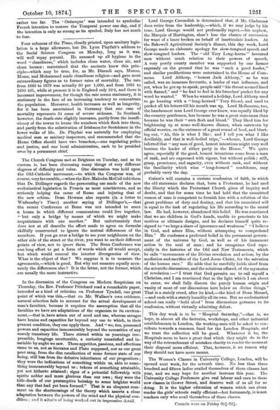Lord George Cavendish is determined that, if Mr. Gladstone does
retire from the leadership,—which, if we may judge by his tone, Lord George would not profoundly regret,—his nephew, the Marquis of Hartington, shan't lose the chance of succession for want of a lance broken on behalf of inarticulate leaders. At the Bakewell Agricultural Society's dinner, this day week, Lord George made an elaborate apology for slow-tongued speech and slow-tongued leaders. The "old Tory Long-horns" favoured men without much relation to their powers of speech. A very portly county member was supported by one farmer expressly on the ground that he was "such a good feeder," and similar predilections were entertained in the House of Com- mons. Lord Althorp, "honest Jack Althorp," as he was called, was an immense favourite, a leader of vast influence, and yet, when he got up to speak, people said "his throat seemed lined with flannel," and "he had to feel in his breeches' pocket for any word he wanted." When he wanted a holiday, Lord Althorp used to go hunting with a " long-horned " Tory friend, and used to pocket all his letters till his month was up. Lord Melbourne, too, the handsomest man Lord George ever knew, was equally liked by the country gentlemen, less because he was a great statesman than because he was their "own flesh and blood." They liked him for brightening up at some well-known dinner, when careworn by official worries, on the entrance of a great round of beef, and blurt- ing out, "Ali; this is what I like ; and I tell you what I like devilishly, and that is well-boiled tripe,"—whence, Lord George inferred that "any man of good, honest intentions might very well become the leader of either party in the House." We quite agree, especially if the good, honest intentions come from a man of rank, and are expressed with vigour, but without polish ; still, grasp, prescience, and sagacity, even without rank, and without the familiarity which wins " long-horned " confidence, may probably carry the day.






































 Previous page
Previous page